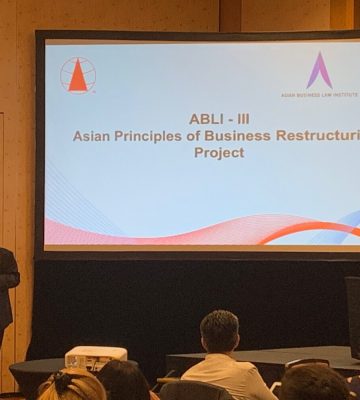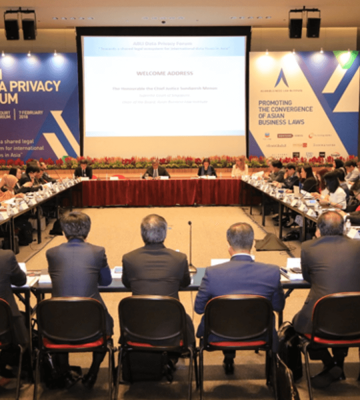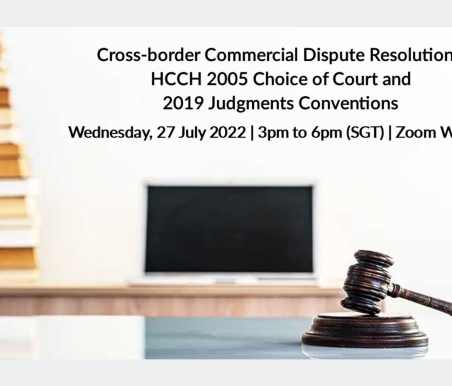On 31 March, Managing Partner of Singapore and Head of Asia for Mishcon de Reya, Tahirah Ara, will be speaking at a second webinar organised by ABLI on the use of Singapore (and other offshore jurisdictions) to restructure Indonesian companies. This follows on from the highly successful and well attended first webinar on this subject one year ago, which Tahirah moderated.
Ahead of the webinar, Tahirah sat down with ABLI to give some preliminary thoughts and share what has kept her and her team busy in the past 12 months.
ABLI: Last year’s session on this topic was very popular. In fact, queries to watch the webinar recording continue to come long after the session was concluded. Why do you think there is so much interest in this topic?
Tahirah Ara (TA): Some of the biggest restructuring cases involving complex issues in this region come from Indonesia. As mentioned at last year’s talk, the use of Singapore vehicles is common in many Indonesian debt financings. Further, Singapore updated its insolvency laws, specifically by adopting the UNCITRAL Model Law on Cross-Border Insolvency in 2017 and passing the Insolvency, Restructuring and Dissolution Act 2018 (the “IRDA”) which came into force on 30 July 2020. But it takes time for practitioners to figure out how they can leverage these new changes to restructure Indonesian corporates, and that happens one case at a time. The restructuring of PT Pan Brothers Tbk in Singapore is probably the most interesting new case and something we will discuss in the seminar. Indonesian courts generally will not recognise foreign court judgements but in that case an Indonesian court recognised a moratorium granted in Singapore over creditors of that company.
There is also the cross-jurisdictional complexity of the subject matter that makes it interesting. Many Indonesian companies carry foreign debt, which is usually governed by English or New York law, so the laws of those jurisdictions in addition to Indonesia need to be considered. In the case of English law governed debt, broadly, the Gibbs rule requires that only English courts compromise debts governed by English law. There have been some additional cases in the UK reinforcing this position and we will discuss how the Gibbs rule will impact the restructurings of Indonesian companies such as Garuda Airlines.
Finally, I think there is a lot of interest from lawyers in this area because it involves not just understanding the law but how to apply it in problem-solving ways. So, this time the seminar will also include a fact pattern and questions, and we will discuss the various strategic options available to the borrower and to creditors based on what we have seen in recent Indonesian restructurings. I anticipate that this discussion will be a lot of fun for the audience.
ABLI: Are you as busy on restructuring deals as you were last year when we spoke?
TA: We remain very active on restructuring deals. Not all the restructuring work we do has a court element to it. A lot of it is consensual agreements between lenders and borrowers or new lenders coming in to refinance existing debts. The work we do, however, is all cross-border. I have English, New York and Singapore lawyers as part of my restructuring group and most of the work we do is on the borrower side.
ABLI: Aside from heading Mishcon’s restructuring practice in Singapore where you are also the Managing Partner, what other legal trends are you seeing in Singapore?
TA: Our office, which opened in May 2020, is growing rapidly and we now have 15 lawyers across three areas: Transactions, Disputes and Private Wealth. In addition to finance and restructurings, we have a strong M&A practice and we have seen an uptick in M&A work. In the last three months, we closed two M&A deals involving assets in Indonesia. Our Disputes team, which includes two partners, covers several industries, including oil and gas and insurance, but most interestingly we see a lot of incoming work relating to cryptocurrency, in particular seeking recovery of cryptocurrency theft, which I find fascinating. For Private Wealth, given Mishcon’s premier reputation in this area, our office in Singapore has been very busy advising on setting up family offices and family governance for ultra-high-net-worth families and providing advice on UK tax law, as unlike most international firms, we have a UK qualified tax lawyer with us in the Singapore office.
Tahirah will be joined by Emmanuel Chua, Local Principal of Baker & McKenzie Wong & Leow and Narada Kumara, Partner and Practice Group Head of Restructuring and Insolvency, Budidjaja International Lawyers at Season 2 of Utilising Singapore (and Other Offshore Jurisdictions) to Restructure Indonesian Companies on 31 March 2022.
Registration is open here. Members of the Singapore Academy of Law can redeem their SAL C$ for this webinar here.


![[Interview] Pre-packaged Insolvency – Doing it [Interview] Pre-packaged Insolvency – Doing it](https://abli.asia/wp-content/uploads/elementor/thumbs/Interview-Pre-packaged-Insolvency-–-Doing-it-r77cm9j6r3m4gpkq8hoi6opr7ccy1gftl03kr10f4w.png)


![[Recap] Upcoming Indonesia Personal Data [Recap] Upcoming Indonesia Personal Data](https://abli.asia/wp-content/uploads/elementor/thumbs/Recap-Upcoming-Indonesia-Personal-Data-r77akrjjgtgvm69gvzbzezrvjcy562b87d9749ifis.png)
